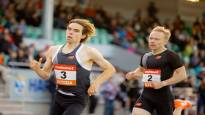The 1977 Tampere Kaleva Games saw several world-class results.
The reigning Olympic silver medalist in the pole vault Antti Kalliomäki crossed the bar at the Ratina stadium from a height of 545, Reijo Ståhlberg pushed the ball 20.77 and Seppo Hovinen scored 86.88 in the javelin. All of the aforementioned results would have kept her out of the medal game a year earlier at the Montreal Olympics.
It also happened on the track in Tampere.
The audience that came to the place saw, among other things, the top-quality men’s 5,000 meters WC final, but one of the races stood out above the rest. Ari Paunonen ran 1,500 meters solo in a time of 3:38.07, which is still the Kaleva Games record.
Two Finns for the World Championships?
Let’s jump 46 years from those WCs to today. The GP race that took place in Joensuu on Wednesday was remembered for its very high-quality races in a domestic sense.
Although several countries will hold their championships this coming weekend, the person responsible for selecting the athletes for the Joensuu race Tuomo Lehtinen had once again organized a high-quality competition event for Finnish runners.
The men’s 1,500 meters took the crown, with Joonas Rinne and Santtu Heikkinen ran their record.
Rinne’s 3.37.65 and Heikkinen’s 3.38.17 guarantee that both have a realistic chance of reaching the World Championships in Budapest through the ranking.
At this point in the season, the World Cup ranking is updated every Wednesday, but rounding the results is already possible. As for the slope, the average points of the five races rose from 1,171 to 1,183 on Wednesday, and on Heikkinen from 1,167 to 1,178.
For now, 1,172 points would qualify for a World Cup place in the ranking, but the required number of points will surely increase as we approach the end of the World Cup dialogue window, on July 30.
However, Rinne and Heikkinen are strong, because both of them have a point competition that is clearly weaker than the rest of the season: Rinne has 1,143 points and Heikkinen has 1,158 points.
Whatever the duo’s exact ranking next Wednesday, it is already clear that Finland has two potential 1,500m World Cup runners. It is exceptional, because only three Finnish men have made it to the representative team on that trip since 1983 in the World Championships.
Antti Loikkanen missed the heats in Helsinki 1983. Competed in the quota place of the host country Jonas Hamm experienced the same fate at the WC home games in 2005. Ari Suhonen didn’t get to the starting line of the ton vitos in Rome 1987 after 800 meters of work.
A speed run from the Kaleva Games
In the hunt for Rinne and Heikkinen’s World Cup place, the Kaleva competitions in Lahti will take a key position.
The reason can be found in the ranking value of the Championship. They belong to the B category, which offers excellent placement points to those who have achieved SM gold and silver.
The 1,500-meter WC final will be run on July 28, i.e. three days before Paunonen’s Kaleva race record of 3:38.07 turns 46 years old.
If Rinne and Heikkinen ran under Paunonen’s record at the Lahti stadium, the ranking points and times would guarantee well over 1,200 points. That would be enough for both of them, with a high probability, for a place in the World Cup.
In the last decade, the men’s 1,500-meter WC final garnered its biggest headlines in the national media in 2013 and 2017, when the winning times in the tactical runs exceeded four minutes.
– Hyi hävetkää, the 1972 Olympic champion and Finland’s record holder Pekka Vasala your mouth In Ilta-Sanom in 2017when Rinne had won his first SM gold with a time of 4:10.32.
Vasala can sleep peacefully at night with the upcoming Kaleva Games in mind, because this year Takuu’s speed will be driven by a hare in the WC finals of the ton vitos.
Normally, the focus is on the struggles between the runners at the World Championships, but since a place in the World Championships is an even rarer thing for a Finnish male runner with a ton of speed, timing plays an exceptionally bigger role than medals.
At the end, I will mention the timing. In the 1977 world statistics, Paunonen’s time of 3:38.07 at the Kaleva Games came within two seconds of the third fastest East German of Thomas Wessinghage.
Even though Rinne and Heikkinen move in the same terrain as Paunonen, they have enough to cover with the Nordic level gauge alone.
Sweden in June Andreas Almgren came in 12th place with a Swedish record of 3:32.00 in the Oslo Diamond League, which was won by other Jakob Ingebrigtsen. His time of 3:27.95 is a European record and the number one result in the world statistics. Norway, who broke the 3:30 mark, could also fit between the two Narve Gilje Nordås.
The aforementioned Nordic colleagues are still a fraction of a second ahead of Finland’s top two, but that does not remove the fact that Finnish endurance running is just beginning to emerge. Thinking about the future, the sport needs, above all, more new role models.
A World Cup representative place in Budapest would be a significant step, not to mention if there were two places.
